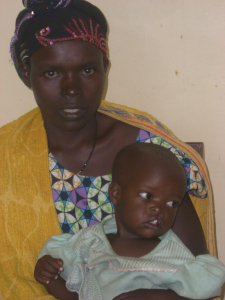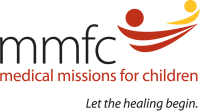Anne Bonner, RN has worked in an operating room for 28 years, first as a surgical technologist and then as a nurse. She lives in Massachusetts and works at the Beth Israel Deaconess Medical Center (BIDMC) in Boston. She has been a volunteer with Medical Missions for Children (MMFC) since 2002. This was Anne’s first mission to Gitwe, Rwanda. Her observations are keen and the images she evokes with her words are vivid. Enjoy!

February 26
I am finishing my packing for the mission. When I decided on this career path at age 18, I never dreamed it would take me to Africa!
February 27
We are leaving Logan Airport in Boston. We will meet up with the rest of the team in Washington D.C. They are coming in from Stanford, California, Chicago IL and Saratoga Springs, N.Y. We will all fly out of the states together. We are aware that in a little over a month, just after we return from a mission that we have just now begun, it will be the 15th anniversary of the genocide. We feel humbled and honored to play a small role in the healing of Rwanda and its people.
March 1
After multiple plane rides (Boston to DC; DC to Italy; Italy to Ethiopia; and Ethiopia to Kigali, Rwanda) and a 2 1/2 hour van ride, we arrive in Gitwe. The entire travel time door to door is just over 24 hours. Gitwe is a tiny and remote village – and as visitors we were noticed immediately and met with intense curiosity, even though most of our team has been here before.
We went immediately to the hospital and I was surprised to see that it was a three story building. When I entered the hospital, though, I realized that it was nothing like the health care facilities we have back home. I was shocked to see that the hospital pharmacy had less medication than most of us have in our medicine cabinets. There was a laboratory technician, but he couldn’t always run basic blood tests because his equipment sometimes worked and sometimes didn’t. The x-ray technician told me that until last year, when MMFC brought her one, he never had a lead apron. In Gitwe, it is strictly no frills. Patients are brought to the O.R. by stretcher even when it is an emergency. There are no IV poles. There are no big teams of medical personnel. When laundry needs to be washed at the hospital, it is hung on lines outside to dry. Despite their limited resources, though, the nurses were proud of their work and eager to discuss issues such as how to prevent HIV transmission in newborns and methods of birth control.
March 3
It is a busy work day. One young boy had a keloid (an overgrowth of tissue) over his left ear. The keloid was the size of a small child’s fist. He’s had it for an unknown length of time and one of surgeons, Dr. Craig Roberts was able to remove it in about 20 minutes. This boy just stared in awe into a mirror in the recovery room. He couldn’t believe it was him.
Rwandans are friendly but not effusive in expressing their emotions. A raised eyebrow or a handshake lets you know how deeply our presence is appreciated.
I put up a piece of paper on the wall and asked the translators to write down words or phrases they think we can use. I’ve learned how to say the word for yes, no and good morning. I’m off to a good start.
March 4
It is another busy work day. One patient was a woman with a cleft lip who was between 40 and 50. No one here knows for certain how old they are, let along what day of the year they were born. That is because in Rwanda, a person’s birth date is neither recognized nor celebrated, and so there is no reason to remember it. It didn’t matter, though. She looked amazing after Dr. Denny Snyder operated and repaired her lip.
I learned how to say “Do you have pain?” in Kinyarwanda. I’m getting the knack of this!
A group of children have taken to following us at the end of the day when we walk back to our host’s house. The entire time they laugh with us and shout to us, “Give me a pen” and believe it or not, a pen or pencil really is a big deal for these children. With it they can go to school, do the lessons and learn. Without one, they can’t. It is as simple as that.
March 5
Samuel, a patient from yesterday, stopped by before going home to give us a note he wrote thanking MMFC. A hug and a note and we’re happy.
In the afternoon we give up the operating room to the local physicians so they can perform a C-section. While a number of C-sections are routinely performed here by local physicians, there is no neonatal unit.
March 7
It is a memorable day. There is one patient who is a young woman around 20 years old who said she wanted to be a nurse. Her mother told us how it broke her heart when she recently learned how badly her daughter had been taunted and isolated growing up. She never knew because her daughter never told her. She did not want to make her mother sad. We had finished the surgical reparation on the daughter’s lip and repaired her cleft and when I stepped out of the O.R., I saw her mother in the hallway crying and staring at the recovery room door. When she saw me, she pointed to the door and said “[t]hat’s my daughter”. I said “I know. She is beautiful.” The mother hugged me and said “[n]ow others will see what I see.” They certainly will.

March 8
We are in our second week. After lectures, Dr. Snyder invites the hospital dentist and the medical students (many of whom serve as our translators) to observe and participate in the surgeries. They are as eager to learn as we are to teach.
March 10
It is an extremely busy day. The word has spread quickly that we are here. Yesterday a man named Emmanuel came to us and we performed a cleft lip repair on him. Today, a friend of Emmanuel’s came to us. He told us that after Emmanuel had recovered from his own surgical procedure, he went straight home, found his friend and said to him “Don’t eat anything. Go straight to the hospital in Gitwe, they will fix your face like they did mine.” It’s not always as simple as that but fortunately he listened and he was an eligible candidate for surgery.
I learned how to count to ten in Kinyarwanda today.
March 11
Vianney Ruhumuliza RN, an MMFC volunteer who now lives in Michigan, is originally from this part of Rwanda. So tonight, we had the pleasure of celebrating our few remaining nights in Rwanda at his parents’ home for dinner. It was lovely.
March 12
This is our last working day here in Gitwe. After finishing the last of our surgical cases in the morning, we pack our belongings. We have brought with us some wonderful equipment that has been donated to the hospital and the rest of our supplies and equipment will either be stored at our host’s home, or brought back to the states with us to be used on our next mission. Before heading home to the states tomorrow, we will spend our last night in Kigali, Rwanda.
“Imana yirirwa ahandi igataha mu Rwanda.”
“God spends the day elsewhere, but sleeps in Rwanda.”
Rwandan Dictionary (Kinyarwanda-English)






















